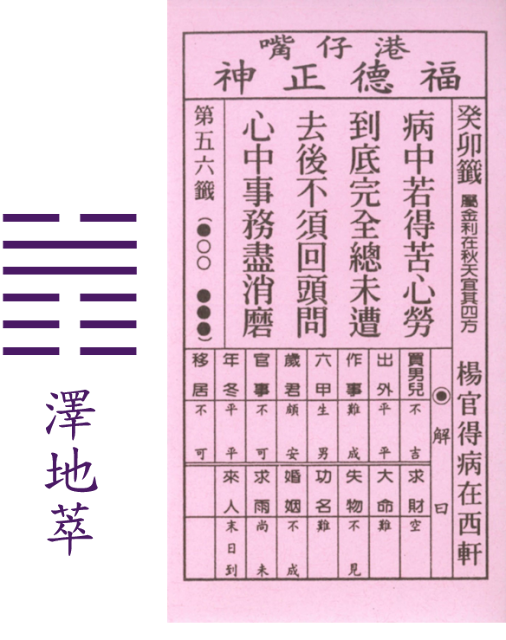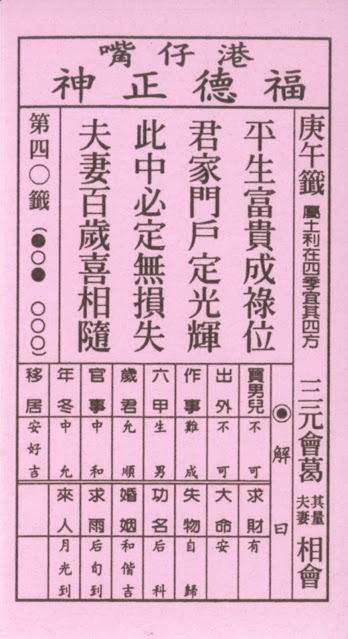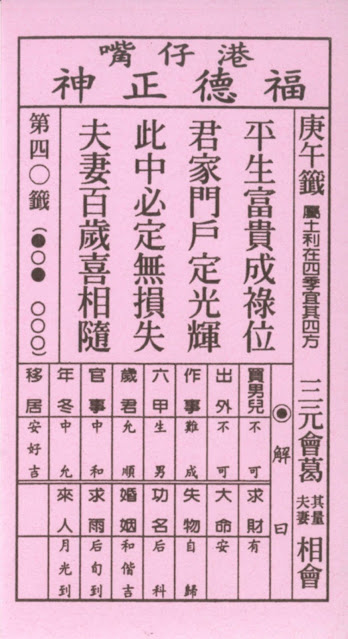第56籤 萃卦 56th DMP: Cui
初六:有孚不終,乃亂乃萃。若號,一握為笑,勿恤,往無咎。
六二:引吉,無咎,孚乃利用禴。
六三:萃如嗟如,無攸利。往無咎,小吝。
九四:大吉,無咎。
九五:萃有位,無咎,匪孚。元永貞,悔亡。
上六:齎咨涕洟,無咎。
---------------------------
萃:亨,王假有廟,利見大人,亨,利貞。用大牲吉。利有攸往。
---------------------------
註:大部份的易經書籍,爻詞斷點均以逗號標註。本宮以文法邏輯判斷略作調整。
---------------------------
萃:亨,王假有廟,利見大人,亨,利貞。用大牲吉。利有攸往。
萃卦:烹煮(食物),(以迎接)君王來到宗廟,適合與德高望重的大人物見面,順利,最好堅定守份。使用牛來祭祀(隆重而盛大的舉行活動)是幸福的。對於將來要做的事也是有利的。
Cui: Cooking (food), (to welcome) the king to the ancestral temple, it is suitable for meeting with high-ranking people. It is smooth, and it is best to be keeping duty. It is blessed to use cattle for sacrifices (a grand and grand event). It is also beneficial for things to be done in the future.
萃:
當名詞用意為羣、類及聚在一起的人或事物。
When a noun is used it means gathering of people or collection of things
當做卦名時,為名詞,所以這個卦有聚集、匯集之意。
When used as the name of a hexagram, it is a noun, so this hexagram has the meaning of gathering and gathering.
亨:
讀作「哼」時,意為通達、順利。
讀作「烹」時,意通烹,即「煮」。
When pronounced "heng", it means smooth.
When pronounced "peng", it means cooking.
王假有廟:
大部份解釋為「君王來到宗廟」。
大部份解釋為「君王來到宗廟」。
Most of them are interpreted as "the king came to the ancestral temple."
大牲:
供祭祀用的牛。中國古代只有帝王祭祀土神和穀神時才可使用牛為獻祭品。
大牲:
供祭祀用的牛。中國古代只有帝王祭祀土神和穀神時才可使用牛為獻祭品。
Ox for sacrifice. In ancient China, only the emperor could use cattle as sacrifices when offering sacrifices to the earth gods and valley gods.
攸:
放在動詞前構成名詞性詞組,相當於「所」。
攸:
放在動詞前構成名詞性詞組,相當於「所」。
Put it before the verb to form a noun phrase.
---------------------------
初六:有孚不終,乃亂乃萃。若號,一握為笑,勿恤,往無咎。
最初的陰爻:有信用但不能堅守到最後,所以才會引發動亂與集會。若是有情緒激動者,只要伸手言和,不要憂慮,持續向前不會有災禍。
---------------------------
初六:有孚不終,乃亂乃萃。若號,一握為笑,勿恤,往無咎。
最初的陰爻:有信用但不能堅守到最後,所以才會引發動亂與集會。若是有情緒激動者,只要伸手言和,不要憂慮,持續向前不會有災禍。
Six at the beginning means: There is credibility but can't stick to the end, so it will cause turmoil and rallies. If you encounter someone who is emotional, just extend your hand to make peace, don't worry, and continue to move forward without disaster.
孚:
當名詞用時為信用、信譽。
孚:
當名詞用時為信用、信譽。
When the noun is used as trustworthiness, credit, prestige.
乃:
當副詞用時為「於是」、「就」的意思。
When used as an adverb, it means "then" or "whereupon".
萃:
當動詞用時,解釋為「聚集」。
When the verb is used, it is interpreted as "to gather".
號:
讀音為「毫」時,意思為「拖長聲音大聲呼叫」或「大聲哭」。引意為群聚的人當中,情緒較為激動者。
When pronounced "hao", it means "calling out loudly" or "crying loudly". It means people who are in a crowd, those who are more emotional.
恤:
在此當憂慮解釋。
Worry is explained here.
因公平的做法沒有持續到最後,有人直接表現出不滿。此時錯在執行者,所以執行者需態度柔軟,與群眾溝通,使其明白困難點與改進方法,讓大部份的人能滿意。
Some people directly expressed their dissatisfaction because the fair practice did not last to the end. At this time, the fault lies with the executors, so the executors need to communicate with the masses with a soft attitude, so that they can understand the difficulties and improve methods, so that most people can be satisfied.
---------------------------
六二:引吉,無咎,孚乃利用禴。
位於第二層的陰爻:以引導的方式處理是好的,沒有罪責。信任度高的人,才能被委以主持夏日祭典的職責。
Six in the second place means: Dealing in a guided manner is good and without guilt. Only those with a high degree of trust can be entrusted with the responsibility of presiding over the summer festival.
孚:
在此可理解為「為人所信服」意即「擁有高信任度」。
Here it is interpreted as "convincing" which means "having a high degree of trust".
音「月」,中國古代宗廟祭祀的一種。夏、商二代為春祭,周代則改稱夏祭。因夏祭最簡,引申為簡便、從簡、簡約的祭祀。
The sounds like "yue." It is a name of an sacrificial ceremony in ancient China. It is a simple and concise way of offering sacrifices.
群體的治理,如同治水,以引導的方式為佳。若只是一昩的以圍堵的方式管理,最後只會因小小的破口而擋不住滔滔洪流。
Group governance, like water governance, is best done in a guided way. If it is only managed in a way of containment, in the end, it will only be unable to stop the torrent due to small breaches.
初、二爻除了強調「信用」的重要外,也在提醒得卦者要謹守分際並柔性對待其他不同意見者。
In addition to emphasizing the importance of "credibility", the first and second lines also remind the recipients of hexagrams to keep their duties and be gentle with those who disagree with them.
六三:萃如嗟如,無攸利。往無咎,小吝。
位於第三層的陰爻:不管是高大到令人讚嘆或憔悴到令人惋息,都沒有什麼關係。過去的一切沒有罪責,只略顯小氣。
Six in the third place means: Whether it is gathering in sigh or praise, there is no benefit at all. There is nothing wrong with leaving, just a little stingy.
萃:
萃:
當形容詞時,有三種意思:
When used as an adjective, it has three meanings:
1.草類叢生的樣子。Bush.
2.通「悴」,氣色不好的樣子。Wan and sallow.
3.通「崒」,巍巍高大的樣子。Towering.
如:
用於語末時,相當於「⋯⋯的樣子」。
用於語末時,相當於「⋯⋯的樣子」。
Used at the end of a sentence, it is equivalent to "look like...".
嗟:音同「街」,此字有二個根本相反的意思。
1.表示感傷、哀痛的語氣。
2.表示贊美的語氣。
The sound is the same as "jie", and this word has two opposite meanings.
1.Expresses a sentimental, sorrowful tone.
2.Express the tone of praise.
吝:
1.當用的財物捨不得用,過份愛惜財物。
2.耻辱。
1.Expresses a sentimental, sorrowful tone.
2.Express the tone of praise.
吝:
1.當用的財物捨不得用,過份愛惜財物。
2.耻辱。
1.The property that should be used is reluctant to use, and cares for the property too much.
2.Shame.
---------------------------
九四:大吉,無咎。
位於第四層的陽爻:非常順利的,無罪責。
---------------------------
九五:萃有位,無咎,匪孚。元永貞,悔亡。
位於第五層的陽爻:聚會中有地位,沒有罪責,也不用付出。長保堅定守分,就不會有令人懊悔的事發生。
2.Shame.
---------------------------
九四:大吉,無咎。
位於第四層的陽爻:非常順利的,無罪責。
Nine in the fourth place means: Great good fortune. No blame.
九五:萃有位,無咎,匪孚。元永貞,悔亡。
位於第五層的陽爻:聚會中有地位,沒有罪責,也不用付出。長保堅定守分,就不會有令人懊悔的事發生。
Nine in the fifth place means: There is status in the gathering, no guilt, no pay.
匪:
當副詞用時,解釋為「不」。
當副詞用時,解釋為「不」。
When an adverb is used, it is interpreted as "not."
孚:
在此通「付」。
在此通「付」。
"Pay" here.
Six at the top means: Sighs, tears (sincere repentance), no guilt.
齎咨:
音「機資」,嘆息。
音「機資」,嘆息。
The sound is the same as "JiZi", sigh.
涕:
眼淚。Tears.
涕:
眼淚。Tears.
洟:
鼻涕。Snivel.
---------------------------
卦爻匯意:
盡人事,聽天命。守份的做好該做的事,真誠的對待他人及自己,不攀龍附鳳,不羨富輕貧,其他的事,就交給老天爺了。
-----------------------------------------------------
籤頭故事解籤
The Stories and Their Metaphors on the Divine Metaphor Papers
第56籤 楊官得病在西軒
-----------------------------------------------------
萃的異體字(摘自漢典)












留言
張貼留言